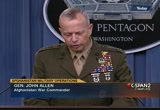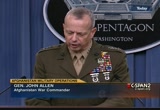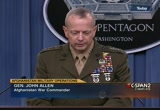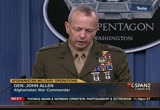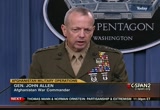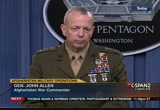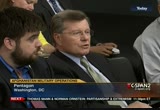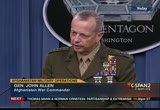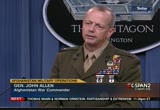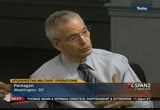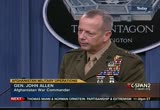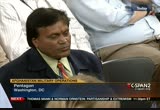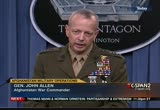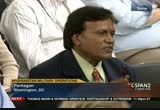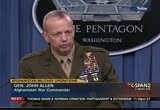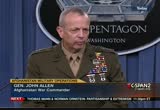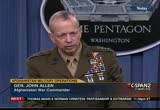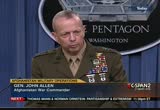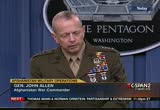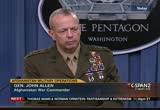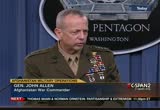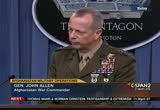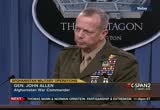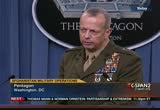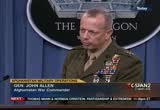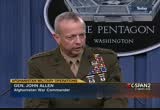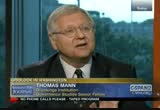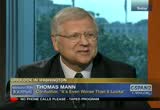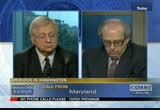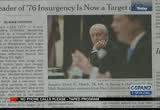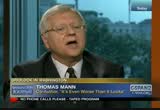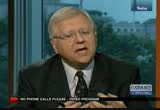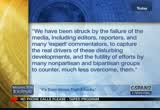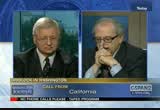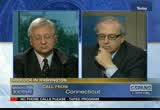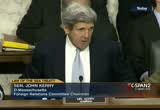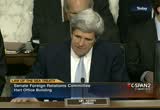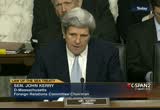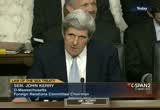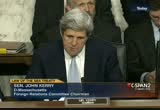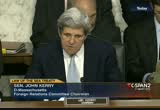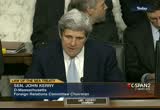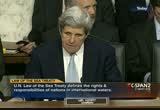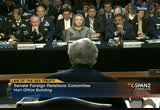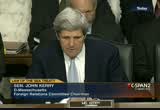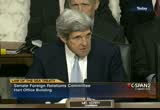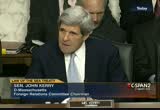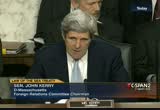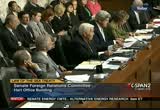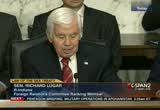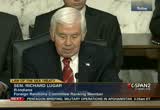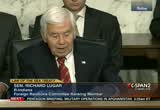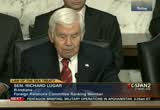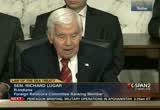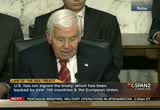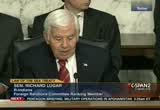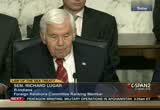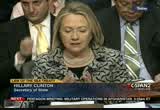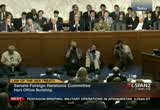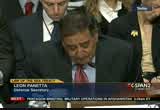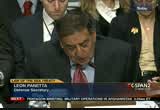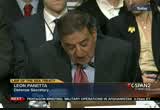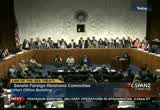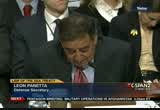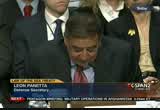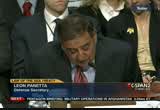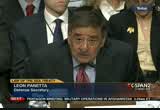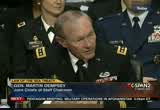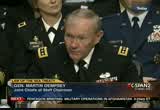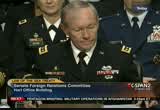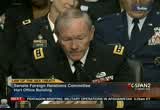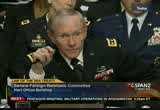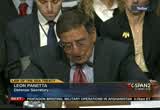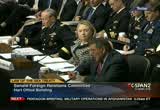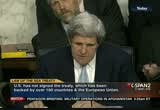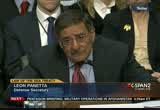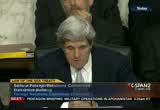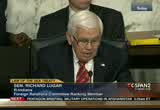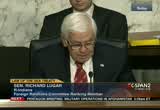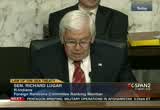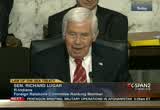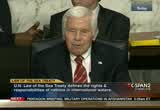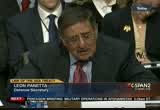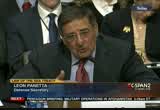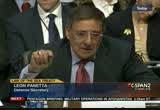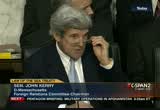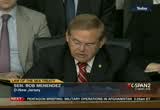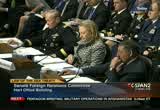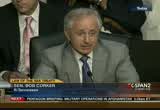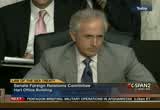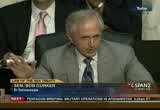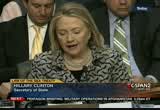tv Capital News Today CSPAN May 23, 2012 11:00pm-2:00am EDT
11:00 pm
11:01 pm
in the wake of this historic summit as the taliban see that their time grew short, they can choose to be part of a prosperous future, but they can never prevail through the use of violence and intimidation. this campaign has been difficult and it has been costly, but i believe that the campaign is on track and i see it everyday the evidence of progress and we are making a difference. we are fulfilling the listened road map of transition in the international community is standing with the people of afghanistan now and into the decade of transformation. last i would like to take a brief moment to comment on the announcement yesterday by the state department that ambassador ryan crocker again running and has been like a brother to me. we served together first when i was in eleanor in iraq in 2007 and 2008. he's been a mentor for me in many ways and i am confident
11:02 pm
that the course of the history of afghanistan and all the countries that he served as a diplomat will be inextricably altered for the better because the selflessness and skills and diplomat and a great american patriot. we will always remember this sacrifice and service and i am a better man and a better officer for having served with him both in iraq and now again in afghanistan, and he will be missed. with that, i would be pleased to take your questions. >> general, you talked about the last weekend, but over the last couple of weeks some of the news about pakistan has been heartening including today the osama bin laden raid over the yesterday the cuts for pakistan.
11:03 pm
at this point do you see the relationship deteriorated, do you think pakistan is indicating that it isn't willing to partner in that region and how critical at this point is that considering that a lot of the war may depend on their efforts on the border of. >> i don't see necessarily that it is a deterioration. i think the fact that we are talking about reopening the granda line of communication is a very positive step in that regard. now it is a negotiation and the negotiations take time, so i can't predict what the outcome will be and how soon that would be. but i recently led a team to islamabad to renew the pakistani military in the context of the tripartite commission. first time in a year it was a
11:04 pm
very positive conversation about taking steps and measures to prevent a recurrence of agents of 25 to 26 of november pakistan has its own challenges on the eastern side of the international frontier with an insurgency counterinsurgency campaign and it's been engaged in that for some period of time. and the effect of many of the operations have been helpful on the other side of the border. but we hadn't had a conversation with them and almost a year on that level. and so, with reopening of the conversation about the ground line communications with the i think positive outcomes of the conversations that we had over two days in islamabad i don't see that there's a decrease in
11:05 pm
the relationship or a decline this early. i fink we are pleased to improved where we were coming and i look forward to continuing a constructive series of engagements with the general in the pakistan military over time. >> to the have other meetings scheduled? >> will again, i'm not engaged either in the negotiations for the opening of the ground when communications, nor am i engaged in the policy level conditions in the government. but we committed ourselves to as the military commander and was also accompanied by a general, the chief of defence of afghanistan. we committed ourselves to recurring meetings to ensure that we are probably managed to the time of the ground, the passage of time from a year ago when we last met with the idea
11:06 pm
of creating a constructive long-term relationship between afghanistan and pakistan everywhere. so i was encouraged in that. >> from my perspective and the relationship between the u.s. and pakistan now appears to be as bad as it's been since the start of the war in afghanistan. you say you see a chance to improve it, how, where do you see the chance for improvement since they're appears to be a stalemate the pakistanis demand to stop drone at tax no agreement on the ground lines of communications, and if i could also ask is there a danger here? because we have heard for years that pakistan was of a much larger strategic importance than
11:07 pm
afghanistan could ever be. is there a danger here that i could do carry a rate to the point where that region, the entire region could be controlled? >> let me hit the last first. i think pakistan and the region are extraordinarily important to our policy of comes in the region. and we cannot -- i think we need to be careful not overstating the progress we are making but i think we have made real progress in the last several weeks that we were not even having before. and we should build on those. we should seek opportunity for common ground. now again, i'm not in the policy world. but we had a very important conversation with the pakistanis about seeking both the strategic congruence in what our long-term outcomes would be for both afghanistan and pakistan in terms of the insurgency and the
11:08 pm
destabilizing influences in the region. we talk about and operational relationship that could leverage our respective military is on each side of the border and we talk about the sort of tactical measures we could take on the recurrence of what happened on the point that -- 2050 and 26 of november of last year. all of that is positive from my perspective. any time that you can talk and can create opportunities for discussion, any time where the objectives of all the parties is ultimately some sort of a strategic outcome that can benefit the region and the component elements in the countries i think that is a positive thing. we are not there yet. we have a conversation that needs to be had, but i think there's a real opportunity here and we should be seizing that if we can. with regard to fatah, the pakistanis are engaged in the significant insurgency themselves in the federal remeasured
11:09 pm
11:13 pm
my question is, if there are other terrorists inside of pakistan, the u.s. is still asking where we go from here? >> please answer the question. [inaudible question] >> pakistan isn't going anywhere. pakistan is always going to be 1500-mile order along the afghan -- a long attack afghanistan trust has been a problem. and so, in order to overcome
11:14 pm
many of these issues, we are going to have to build trust again in the investigation that was done, in the aftermath of the cross-border incident. one of the findings was that there was an absence of trust that created a sequence of events that resulted in the death of 24 pakistani troops. sooner or later, there is a certain amount of risk that needs to be taken in a relationship in order to build trust. we are going to have to do that. pakistan is not going to. afghanistan is not going anywhere. the region will best be served in terms of long-term stability if we can build trust with all the parties in that region. i'm not talking to india, so i will just be very clear there. i have no involvement with india at all. >> just a quick question. people to people trust, how can you build that trust, because the problem is the people of
11:15 pm
pakistan and because they are not getting what they're supposed to get and there are so many demonstrations going on because of high-rise of oil prices and around the country. >> well, that would seem to be a question that should be asked of islam a bad, not the commander of isaf. >> i would like to hear what you have to say, and i would like to hear your thoughts. >> counterinsurgency is not, you know, a single approach to all things. your question is an important question. it is important for commanders to be able to adapt their strategy. ultimately, to fit the conditions on the ground. as you have heard me say before, perhaps, in any counterinsurgency, the foreign forces really need to do a variety of things, but the two
11:17 pm
11:18 pm
brings about success in counterinsurgency are principles that apply wherever you go. a successful counterinsurgency will be one that is waged by forces that understand the culture in which you are offering and what drives the principles of the people that you are seeking to help. it understands the language and the history. the terrain for us in afghanistan is substantially different than the terrain offered in the province in iraq. but many of the principals associated with the counterinsurgency waged in iraq and other places transfer. you just need to come as the commander, recognize that the operational environment will cause you to have to adapt that strategy, and for me, early along in the period that i have been in command, and in my 11 month, it is clear that we need to do all we can to move the ansf into the lead and to get them comfortable with leading
11:19 pm
operations, get them comfortable in close combat with the taliban, give them comfortable with a population center, population-based counterinsurgency. that is really where you see the adaptation. let me come back to a question from a moment ago. the urban distribution network takes longer and it is more expensive. then the ground lineup to mutation. we can provide you the details associated with that. we have had, we maintain stoppage for some. of time -- some period of time. our goal was 60 days in afghanistan as a matter of course against the possibility that we may have to, someday, live off what we have inside the country. once the ground line of communications was closed to us in the media period after the 26th of november cross-border incident, we began to immediately ramp up our capacity to move critical supplies by air
11:20 pm
and by taking advantage of the northern distribution network. it did, in fact, compensate for that, which was either stuck on the ground line of communications. we have about 1000 vehicles stuck on the ground line. that was on the pier. and i hope that gets little bit closer to your point. >> thank you. commitment to the support of the afghan forces, there is a continuing shortfall of trainers. nearly 400 trainers. do you get new pledges at chicago? >> there are trainers into complex. it is trainers in our schools and in the afghan schools -- that it is also, and this goes against your point about the
11:21 pm
change of the counterinsurgency to fit the operational conditions. we are moving to what we are calling a security force assistance platform. where, as our forces, our number untrimmed numbers begin to draw down, we will rely more heavily on advisory teams as opposed to individual instructors or is opposed to partners -- partnerships with units. and so what you'll see is this. we will have a continuing need for instructors, who we are also going to -- we're going to have a need for derisory teams. we been expressed and have been expressing that requirement through a process of force generation through nato, called the combined joint statement of requirements. you hear it called the cjsor process from time to time. this includes military advisory teams, and please advisory
11:22 pm
teams. and we have currently experienced a shortage in those. because we are only implementing a process now, we have some time it will be my intention to continue to emphasize the needs for those kinds of advisory teams in the future because those formations, those advisory teams inside the afghan formations are what continue the upward spiral of their capabilities, but also to sustain him. to help them and advise them in combat. i'm going to continue to make a major point of that emphasis. >> did you get new pledges in chicago? >> we didn't ask for that there. this is a conversation that i typically have with the chiefs of defense and with ministers of defense. but the actual expression of the requirement comes up at with the nato chain through the joint forces command and specifically through shape headquarters. they will be convening another force generation conference very
11:23 pm
shortly, where we will once again emphasized the need for both mats and pats. >> you said that combat operations are likely to continue until forces leave in 2014. it is probably a safe haven for -- that they will continue to operate young 2014 as well. could you talk a little bit about this idea of a layered defense with some of the officials have talked about and how that would work in terms of getting troops out of afghanistan? >> well, force protection is always a very important dimension in any of our planning. i'll give you a general explanation. we are moving into execution now in the drawdown of the 20,000 u.s. troops. but we will be posturing forces to ensure that we are protecting
11:24 pm
the force as it is moving out of the theater. we will also be re-posturing forces against the next phase of the campaign to ensure that we are properly cited to continue the process of pressuring the enemy. the layered defense is in a variety of layers. it will vary, as you might imagine, based on the location and based on the ground. i think what is important to understand, it is not just about american forces. very importantly, it is about the non-u.s. isaf forces, there are about 42,000 of them in the theater now. when we are done for covering 23,000 u.s. or the face to drawdown recovery, we call it, they will still be the 40,000. we will find ourselves september 30 or so with about 60,000 u.s. and about 40,000 non-u.s. isaf forces.
11:25 pm
>> but there's another critical component of this, and that is the afghans themselves. they will be re-posturing therefore formations in a coherent campaign. you heard me use the term operation nawid. they had the lead in the planning, and ultimately, the movement of forces in the theater, beyond the u.s. forces moving out will be the re-posturing of u.s. forces, non-us isaf forces, or the re-posturing of the entire isaf formation. and they were posturing of the ansf specifically, to provide support to the campaign. now, the layer of defense. the layered defense is a common domination of both the isaf and ansf. it is a layered defense in terms of a linear defense, but it is layered in the employment of special operations as well.
11:26 pm
there is really a significant and really a very important, growing capability in the afghan forces of their special operators. nine battalion sized formations, ken backs of commandos, 72 forces of eight teams, within the general directorate of police special units, which is an mo i unit. we have some very high-end, very high-quality commando, slot units, and we use those with increasing capability and increasing interoperability with the afghan national army. not just to create a defense in depth in a linear sense across the terrain, but a defense in depth in keeping the enemy on the move by attacking networks, by attacking support zones and safe havens. and that combination, both afghan national army, isaf general purpose forces, and the
11:27 pm
special operations of all of these three -- isaf special operations, u.s. only special operations and afghan -- it gives us both a layer of defense and a laminated defense, which gives us really some significant capabilities. >> we will wrap up with bill? general, hello. >> good to see you again. >> what will your criteria be for a post- surge drawdown? and can you explain a bit whether or not you been prepared to accept ceding some territory in the areas that have been gained over this war during the transition from 2013 to 2014 and beyond? >> when you say criteria, do you mean beginning and ending at? >> how you determine, basically. >> okay. we will see the drawdown of phase two, the 23,000 u.s. forces. that's going to begin very shortly. the intent is not to deal solely
11:28 pm
with u.s. forces. it is very much in the isaf and ansf effort. so that areas which were covered by, let's say the marines, for example -- as those forces began to thin out, what you will begin to see our afghan forces beginning to fill behind them. and those afghan forces would have advisors in them. and they would be tied to the remaining marine units so that there is still a synergy that can be accomplished. while in absolute terms, eventually our numbers come down, it is not her intention to cede the ground ultimately to the taliban. in fact, it's not even clear that the taliban has the capacity to flow in behind in any numbers that make them relevant tactically. so we are going to watch that very closely. our intent is, of course, to use the ansf forces both in the east and in the southwest to fill in behind the forces that we will be drawing down in the regular
11:29 pm
11:30 pm
23,000 troops praepostor and the battle space from inserting advisers, moving fi ansf increasingly into the lead. also ramadan will be occurring in the very middle of the high off tempo period as often called the fighting season centers quinby dynamics. and the aftermath of the recovery of the phase i intend to take a very hard look at the state of the insurgency and take a very hard look at the ansf and halvey did in terms of moving into combat, moving into the lead planning executions themselves. i will take a look at the operational environment i participate in 2013 to assess what u.s. and non-u.s. combat power need ultimately to continue the process leading the ansf into the lead and 2014 and giving the kind of support they
11:31 pm
need so they will be successful with there's no member out there. it's your question is extremely important. i know that cavallas as to why chain of command and we're going to meet that analysis in the aftermath of the fighting season heat. thank you. [inaudible conversations] think of where everyone has been
11:32 pm
that where they're going to die in front of you can win an academy award someday and the guy behind you can be a future president of the united states or even better than that the mayor of new york city the guy in front of you could be a future nobel laureate not to your right but certainly the one to your left.
11:33 pm
it's even worse than it looks in which they argue that washington partisanship has caused congress to become dysfunctional. we talked to the authors on wednesday washington journal. this is just under an hour. >> the gentleman that for a book are taking a look at congress it's even worse than that looks how the american constitutional system collided with the new politics of extremism. joining us, the author norman and co-author resident scholar of the american enterprise institute thomas mann of the brookings institution where he served studies senior fellow. gentlemen, thanks for joining us. >> happy to be with you. >> the question is if it is worse than it looks, what exactly is worse? >> guest: we are now in a situation which we have a
11:34 pm
fundamental mismatch between our political parties which would become intensely polarized and operate much like parties in the parliamentary system oppositional, no corroboration, drawing the line, but they are operating in a separation of power system in which our founders anticipated genuine engagement collaboration, negotiation, compromise and action so that the two of them coming together to produce governmental dysfunction across the board. >> host: you open the chapters taking a look of the debt ceiling back to the current discussion on the debt ceiling. what is changing that process? >> guest: actually we did a presentation last week in which i think richard murdock, the man who richard lugar for the nomination for the senate indiana are basically saying
11:35 pm
never mind, compromise it's our way or the highway in effect and now we're seeing it in again but in the most destructive way we got the title in the way from two things. one, the system always looks rambunctious you can't solve basic problems a compromise. the second part of it is we've been here in washington emmerson or politics from that in the capitol still to the other end of pennsylvania avenue for 42 years some of them are politically ridiculous. everyone is posturing the games and flipping sides from one to the of the but everybody knew in the end of the they were going to have to vote to make sure the full faith and credit of the united states wasn't challenged. now it is a regular hostage-taking mechanism but the time of the weak economy that is
11:36 pm
just unacceptable. >> they have certainly reinforced the of exacerbated the position strategy of the republicans' one of them rather controversial. the polarization between the parties is not symmetrical it is one of our political parties and they have veered off the track not just in its the ideological policy ambitions which is to reconsider really 100 years of policy, but in terms of process, of being willing to engage in a permanent campaign every hour, every day in every issue even if that means in the midst of an economic crisis having a
11:37 pm
strategy of unified opposition to win every democratic pro proses an unwillingness even if he offers the proposals the have increased themselves only a few years ago to discuss any of that. it's sort of my way, you do what we say or we are going to teach you at the next election, period. >> what will do the democrats play in this then? >> let me also say i think is unfair to blame the tea party for all of this. you have a lot of people that came in 2010 under that guide, but many more members, senior members and leaders who fled the way on this and the republican study committee back in 1973 when a was formed the first director had been a colleague of ours as congressional fellows and was a small fringe group, sort of the right wing caucus, now about 80% of the members and
11:38 pm
we know from robert draper's book on the tea party group that it was a group of leaders and senior members who gathered on inauguration for barack obama have the capitol relief few blocks away to come up with a strategy of voting against everything he was for because he was for it would ever was a net so it's more than that. turning to the democrats they are no angels here. we are not suggesting you have a good party and a bad party. democrats have in the past done plenty of things that were oppositional like the parliamentary party were that were designed more to stomp on the neck of a republican president when he was down. but what we believe is the democrats have generally stayed somewhere within the boundaries of what's been our normal rambunctious politics. this is different. when george w. bush was president and he came in under the worst circumstances imaginable for a president. a week after the most bitter and contentious election not decided
11:39 pm
for 46 days afterwards democrats could have voted against everything he wanted and destroyed the presidency from the beginning. liberal democrats, george miller gave him a huge victory with no time left behind and me and policies they were perfectly comfortable with but in the stimulus package had 40% of almost in the tax cuts with plenty of things would have made republicans comfortable democrats were willing to give a big victory and boosted the beginning of the presidency were willing to cut deals. >> both gentlemen are with us for an hour and if you want to ask questions about the book of philosophy how the commerce operates the numbers will be on your screen, democrats (202)307-0001. republicans, 202-737-0002 and independent, independent phone co. if you want to join us on twitter that is c-span w.j. and if you want to send something through e-mail,
11:40 pm
natural@c-span.org. first call this morning chats with illinois this is on the democrats' line. steve, good morning. >> steve from chats with illsley. >> caller: my name is steve and i am of assessed with numerous things that happened between the bush and obama administration to get i'm upset with bernie friend in the housing bauble that happened. i'm upset with obama's cabinet members about p&g energy. giving billions of dollars to these energy companies and creating 700 jobs between and arizona but it 1600 jobs go to
11:41 pm
malaysia it's just frustrating the way that the department of energy, gsa and all these people spend our tax dollars with no concern about the american people speak to. it's because the discussion changed as far as working together because of the focus on spending issues? >> listen, we are in a situation now where republicans are insisting that the huge deficits that we face now are because of this ramp up in spending by the obama administration. they believe immediate cuts in discretionary programs are what will help the economy. democrats are saying that in
11:42 pm
fact what we need is a balanced package of spending in the short term to bolster demands and get the economy growing we still have very high levels of unemployment. but at the same time, putting in place cuts over the intermediate and long term, which means dealing with our health care costs and increases and setting in motion policies to increase revenues, they are 15% of gdp. traditionally they are around 20, and given the demographic changes, the aging of the population are probably going to have to go 20 to 23%. so the stimulus that president obama put in place may come as the caller suggests, not in every case operate in the way that he would have liked, but the consensus from cbo and every economic forecaster is that it
11:43 pm
helped. it probably wasn't enough, but compared to europe, our growth rate looks pretty good. >> but the cbo saying right now if we let the tax cuts expired and happen, we have an essentials recession in 2013. so, the ideas of the spending and taxing are the same but now we see the potential results, and that's why the republicans are reacting that way. >> guest: it's another part of alarms us. we have problems in the short and long-term that can't be resolved but if you think that the moment at the end of december, all of the bush tax cuts expired. the deal we have with the payroll tax cuts for medicare, the extension of unemployment benefits expire, we are probably going to have the potential government shut down because we are not going to resolve the appropriations for the year that begins october 1st. at this point because house republicans have decided to throw out the very delicate deal
11:44 pm
that is in the wall not just the budget resolution that they reached with the lowest debt limit debacle. we may have the debt limit reached again and that is what we were talking about earlier with john boehner saying we will bring it down unless we get what we want in it and we've got all of these sequesters taking effect on june reversed mindless across-the-board cuts in the short term is all about disasters in the long run you have an of member of the new to solve the problem but you may not be alive along the way. if we end up with a my way or highway confrontation at that point, god help us and that is our problem i think and another part which is reflected what tom is saying is a widespread public misunderstanding of the stimulus we didn't have a typical recession when we rebound quickly. it's one caused by a financial crisis. we are doing so much better than other countries, and the stimulus, without the stimulus we would be possibly close to a depression right now. we know from most of the
11:45 pm
forecasts that millions of jobs and economic growth were created but people don't see it coming and there is an understandable unhappiness with government, unemployment remains stubbornly high and it is a toxic. >> host: show, independent line. >> caller: hello. how're you doing this morning? i have one comment and then a question. the comment is during the bush administration did it was doubled. that's twice. during the obama administration they don't say that much, my question to you is why don't you ever have some programs that can speak about the biggest problems in the budget that is a military related budget which is almost a little over a trillion dollars. all of the votes they never have
11:46 pm
a debate about it please ask this gentleman if they have a program that speaks in terms of the tremendous military budget and putting over 700 bases overseas. host could you want to take anything from that? >> guest: sure. a couple points. one is we do know as we parse out what is causing the debt problem ahead and what has gotten as in the mess we are in now as we move in the $5.6 trillion in surplus in 2000 to now projections of huge debt down the road the tax cuts of 2001, 2003 with the single greatest cause. the war have cost trillions and were on paid for come right behind. the stimulus and the programs enacted in the last couple of years recovery and have now begin to actually phase out of any long-term projection from those costs and that goes back to the point tom made up the need for revenues. on defense, joe has a point it is a point of course the to cope
11:47 pm
with the debt limit agreement that we reached the last time and it's why half of the sequesters, these across-the-board cuts over ten years hit defense pretty hard and the reason we are going to have a confrontation over appropriations in october until december is because even though the congressional republicans and democrats have agreed on this deal, half of it is coming from discretionary spending in half of it is coming from defense, 1.2 trillion republicans are not saying we are going to protect every line of defense, that is what is in the rhine and budget almost unanimously among republicans, and we are going to take the additional amount and more out of the discretionary domestic spending. every group from some symbols to rivlin domenici to the gang of six with tom coburn over to durbin has said we are not going to solve the problem unless we do something about the defense, government spending in general, about the programs like social security, medicare and medicaid
11:48 pm
and also about revenue and if you don't put all of those things on the table there will be no bargain. >> host: our guests are co-authors of the wicked is even worse than it looks how the american constitutional system collided with the politics of extreme. >> pennsylvania republican line. >> good morning. >> both sites are against each other for the last two weeks is like a comedy showing this guy got this money from facebook, he's leaving the country. there's been an attack on rich people for four years and you go back some of these politicians, harry reid, they've been doing this forever and now they are crying about it and the don't get us. he's worked for $5 million in a two million-dollar house. he puts some skin in the game with a pension in charge of
11:49 pm
secret service $23,000 a year. when i watch this, republican or democrat, used to be a democrat and i changed, but this has turned into a joke and we see the speeches of obama, bush raised the tax is up $4.98 trillion years he's over 5 trillion he calls bush unpatriotic. using that kind of system i would think that obama would be treated alike benedict arnold then that this is interesting and i'm glad you are on. thanks for hearing me out. goodbye. >> guest: harry has strong views but at times they don't relate to the underlying facts. obama has cut taxes. he hasn't raised taxes. we would probably be better off in the long run if we put in place some tax increases. all obama has proposed to do is to allow the bush tax cut to
11:50 pm
expire for those households earning more than $250,000. we are going to have to raise a lot more revenue than that if we are ever going to balance our budget. you know, yeah, there is a lot of rhetoric on both sides. but here's the underlying reality. and in the recent years come to the extent that we have had the economic growth, the benefits of that growth overwhelmingly have gone to the top 1%. 93% of the benefits of growth enjoyed by 1%, that's a reality whatever you say. that doesn't mean you have to be against rich people to make sure they pay their fair share of taxes and when someone is willing to give up the citizenships to have the full gains taxes that sends the wrong
11:51 pm
signal. >> host: on the senate side because of the recent statements by senator read about the filibuster. >> the obstacle to moving the president and democrats prefer a program through was the filibuster it's a seldom used device to highlight differences to the public to absolutely routine normal requirement of the 63rd threshold the framers never have that in mind for the senate. when you have a parliamentary like opposition they are willing to lose it on everything and only if you have in the majority reliable 60 vote for cloture can
11:52 pm
you get anything done. >> speaker boehner has a tough job as he said the of the day he's got to keep 218 and a wheelbarrow and the analogy that used to be hurting now we've gone from caps to frogs and that's a tough job and he's not able to do it with of the leadership team behind him. we know that when we are doing the delicate negotiations to try to reach a grand bargain at the time of the last diplomat he and his other leaders were at odds and that made in a drama almost impossible. having said that, he's not becoming productive with his new threat on the debt limit and that is new and troubling phase for all of this.
11:53 pm
let me add that in the senate there's occasional signs, positive signs i suppose we could save we've seen it a few nominations this last week we had the two nominees for the federal reserve and that's been pending for very long time and an admittedly the to peery democrat and republican. we got an appeals court judge throop with a filibuster to get more than the 60 votes required, and we are seeing some agreement on things like that bill to expedite drug approval, so here and there you find something. it's a delicate place. you're trying to find a way in which the two parties can work together now with an underlying strategy by mitch mcconnell who as he said was their fingerprints on anything significant because the president, might get credit for it but also where you have a lot of other members that want to solve problems and they fear of very dangerously in the
11:54 pm
territory with a filibuster it may be that next time the house will be an even bigger problem the senate may provide at least a few glimmers of hope. >> host: john? >> caller: how're you doing today. i want to start by saying i make about $30,000 a year and i really don't have any problem paying more on taxes, but i do want to say that the bush tax cuts, there was the first time in american history that we had the two wars going on that we had tax cuts and the republicans can talk and talk and talk, but there's absolutely 0% that you can balance a budget and cut taxes and history has shown that and the republicans keep saying they want to cut taxes but somebody has to pay for the war.
11:55 pm
its $9 million a month on this afghanistan and billions of the iraq war. i would like -- i don't think the press does a very good job of suppressing the republicans into saying how are we specifically going to take the to wars, cut taxes and balance the budget? >> guest: john is just absolutely right we in an unprecedented fashion engaged in a decade longer war three costly without asking the american people but will not engage in the fighting to contribute. they're solving the immediate long-term problem is greater
11:56 pm
than the river norquist tax payer pledge for every republican official in the house and senate committee. in fact to cut the taxes we would never solve our problems. it is improbable unless we eliminate the government, and i think john, like the president who has said, and simpson-bowles it's a bipartisan package you have to increase revenues and you have to cut spending over time on the health problems like medicare and a medicaid. >> host: john mentioned he makes $30,000 would be happy to pay a little bit more. president obama made a mistake early on not calling for sacrifice on the part of every budget, and by pledging that he wouldn't cut the tax cuts for
11:57 pm
all those making under tutored $50,000 a year it is the fact that the 1% of the enormous amounts on the all obtuseness of people what that level. we know from the book that steve schwartzman, the billionaire who is headed up one of the major investment firms in the country when talking about freezing his tax rate from 15% to what others pay ho likened to hitler invaded poland but it's unrealistic to imagine how to resolve the problem just on the backs of millionaires and billionaires and i think it was a mistake not to make that call for sacrifice early on and that had happened some of what carey was saying about the rich and the rest of the country might have a little bit less of an edge to it.
11:58 pm
>> host: john come independently. >> caller: when president obama was elected president, he is a very strong man and i think that is one of the reasons people wittmeyer them that when he came into the presidency, he came in on the wave of huge expectations that he himself so when he was elected the first thing he went to was health care. one of the big reasons coming from the standpoint of somebody that's not an expert on politics, but it seems to me the american citizen that when you look at health care reform law president obamacare with all these expectations so essentially what i saw happening that made a lot of republicans essentially feel like. in the very beginning of the
11:59 pm
presidency the republicans felt they had no say it's not done without the consent >> guest: if we go back and look what happened in the health care debate as a couple things that stand out. the first is instead of running it through in the first few months of the obama administration everybody basically treated water while a group and other gang of six in the senate led by max baucus democrat and chuck grassley republican including mike enzi and olympia snowe, to other republicans worked for seven or eight months to pull together a consensus bill. what we know is fairly anonymous process they were basically told by the republican leadership of the senator that if they reach a compromise that wasn't accepted by 70% or more of the republicans in the senate that would be the end of it for their
12:00 am
career and at that point of this could be acceptable to 70% of the senate was a capitulation the idea that they were debating most of which ended up in the affordable care act or republican ideas. this bill was basically the republican alternative from 1993 to the clinton health care plan which was written not only by the late john chafee of rhode island, former senator of minnesota, but grassley and orrin hatch who embrace the idea of the mandated and embraced the idea of exchanges that didn't have a public auction, then you throw in some of the elements of the plan and have what is in the affordable care act. ..
12:01 am
>> there was a piece in "the new york times" this morning about the reelection campaign. is there anything from this campaign, that kind of relates to the idea and changes that you have seen over the years? >> of course. the piece in the times is fascinating. it points out that he was the radical insurgent when he first ran to for the senate. they moved a pretty moderate republican party.
12:02 am
and now he is trying to get to the right of candidates, which it is almost impossible to do so. when orrin hatch came to the senate committee was and is a strong conservative by most standards. but he also became a problem solver. and he would never fail in any parents to talk about the relationship he had with ted kennedy. including children's health insurance and a whole post of other things. now he doesn't talk about that anymore, and of course from the reason is, he remembers what happened to his colleague, bob bennett, who by his voting record, was one of the fight the most conservative republicans in the senate. and wasn't even able to win the ability for the nomination. hatch was able to do that because he had collaborated with democrats and because he voted for the bush driven t.a.r.p. plan. hatch is a different hatch than he has been for the last 15 years because the ground has shifted beneath his feet.
12:03 am
richard lugar is often called a moderate. he is a conservative. when he came to the senate committee was one of the most conservative. he hasn't moved. the republican party has shifted. that is a good part of the book. >> host: we have a caller from minneapolis, minnesota. colormap business cannot compete with this. my solution is to let the bush tax cuts expire for everyone, all tax ranges. and i agree with the auto bailout come and i can sort this guy out. you guys are so partisan, they won't get anything done. i think you are full of baloney. >> guest: i'm not sure where to take back, but, one thing i would say, if you look at what has happened with job growth over the last 2.5 years, and it has been sluggish, private
12:04 am
sector job growth has been relatively robust, especially coming out of recession that is caused by enormous amounts of debt. the problem with job boards and trend growth has been in the public sector. while the stimulus to provide a significant amount of money for two years to state and local government, it had to because of their balance budget amendments, it had to go against the cycle politics end of economics and/their budgets. we kept teachers and firefighters in the workforce, there has has still been a hemorrhaging of public-sector jobs, and that has been a big problem for us. it may get worse, in significant part because one of the things that is being talked about is predictably in mitt romney's tax plan. he wants to cut tax rates to 25% maximum rate, with unspecified plugging of loopholes.
12:05 am
he did say to a private group that was overheard by a group of reporters, the one thing he would do is eliminate the deduction for state and local taxes. state and local governments are going to get another big blow down the road if those plans come to fruition. >> host: we have robert from greenville, mississippi. colormap i can tell you in a nutshell how to balance the budget. we need to pull our troops out of iraq, that we can stop taxing the rich, and i guarantee you, -- i guarantee you, our budget will balance itself. finally, there we go. hot dog. amen. >> guest: how do you know for sure?
12:06 am
how do you know it is a guarantee kolko this country is a 75 billion-dollar a year company that has failed. david 15 years. dam. right there. >> guest: i wish it were so, robert, but in fact, project projections over time, which have deficits and debt increased built in having our troops out of iraq and afghanistan, yes, it is a help, but it is factored in. it has happened in iraq already, and we are on track to do it in afghanistan. the game is not insignificant, but it is a fraction of the deficit and frankly, there just aren't enough rich people to
12:07 am
garner enough new revenues. we can get some from them, but it is going to take a whole lot more. letting the bush cuts expire, that would give us the clinton tax rate. it would develop at a healthy pace under those tax rates. it would be a mistake to do it immediately, given the sluggish economic recovery, working toward that end, it is one of the things that is going to be required to balance the budget. >> host: fort myers, massachusetts, we have jake on the phone. >> caller: i just want to stand -- start out by saying what people need to do is stop
12:08 am
fighting in washington and get the job done. we need more bipartisanship. however, i don't agree. to set the parties with bad ideas result in not a good policy. a policy that is bad. we keep talking about taxes and taxation and doing that in this with taxes. i think we need to stop the government spending. overseas and also in this country. i also believe that we spend $11 billion a day and we should abolish a lot of things to stop spending so much money, and also, performer taxes, not just taxes and it is not just spending. >> guest: it is not just taxes and spending. >> guest: certainly, what we know from every group that has looked at this is restraining the growth of spending in almost every area.
12:09 am
you know, jay talked about how to parties with bad ideas can result in bad policy. there is good bipartisanship and there is bad bipartisanship. there is no question that you can have bipartisanship we take the worst parts of the party's ideas and put them together. a collaboration that tries to work in a clearheaded way, at where the money is, what problems there are come and, and how you can solve it, which is what we had with the simpson-bowles commission, what we had was the domenici group that did exactly the same thing and had more innovation in it. and we headed inside with that gang of six. three conservative republicans, to moderate and one liberal democrat. they all came up with a set of balanced ideas in in the same template, that almost any rational group looking at the reality is before the spending is, not much of it, the wars are one thing, but spending that we do on things like diplomacy or foreign aid, is less than 1% of
12:10 am
the budget. we're not going to make it with that. and we're not going to do it without revenues. everybody knows the problem is what happens when we get into the toxic atmosphere now, of this intensely polarized cyberpolitical system. >> host: from kansas we have a caller. >> caller: good morning, gentlemen. how are you? >> guest: just fine. >> guest: fine. >> caller: what i hear, and i hear a lot from washington, it is the other guy that is being unreasonable. when they have these debates. it seems like anytime something happens in washington, it is the other guys guy's fault. it's not my fault. i had nothing to do with it. i don't know how we solve it. as a citizen, what i see, and
12:11 am
maybe i am being unreasonable, i see debt mounting up, icy deficits mounting up, and i hear that we need to increase the stuff. keep on increasing spending, but just lower the rate a little bit. i'm a citizen, at least, hopefully i am, but as i see it, the bigger government gets, the smaller i get. that is where i see this heading. and i suppose i am seeing the only alternative being offered is one-party rule, and that will take care of it and take all of the unreasonableness out of the whole debate. >> guest: i understand the frustration with all of this. it wasn't so long ago, it was 2001, when we had budget
12:12 am
surpluses and the chairman of the federal reserve, allen greenspan, was worried that we would pay down our entire national debt, and then have to buy interest in private enterprise, and that would be a terrible -- it was a result of policies, tax cuts, unpaid for, economic collapse in which deficits and debt automatically increased, because of a fall off of economic activity in which taxes are paid. that is the underlying reality. there is no inexorable growth of government right now. except that which results from health care costs increases. if you want to deal with deficits and debt, you need to get our taxes up to a level of that that we have prospered with with a long time, and you need
12:13 am
to figure out a way to slow the growth of health care. the rest of government now is not growing, you have problems, you have given solutions, one of them is expanding the electorate. how do you expand a? >> guest: we are worried at this point that we have politics driven by the extreme basis. the ones who turnout in primaries and also tend to dominate in a general election, political consultants make a lot of money trying to excite their own parties and frightened to death and then suppress the other side. what we want to do is to change the dialogue and create more of a wait for voters in the middle. our preference, if we could do it, would be a version of the australian system of mandatory attendance at the polls. australia, since 1925, we don't have to vote. but if you don't show up where you can check the balance of the above, you are subject to a fine
12:14 am
of $15, which you can get out of by writing a letter by saying you were sick or traveling or whatever. here in the district of columbia, a 5-cent tax on bags has provided an enormous incentive walkout with cans, or to bring their own bags. that has meant that australia has never had an election since 1925 with a turnout low 90%. the average is 95%. here's the difference. it is not just the people turn out. it's not just the bring a lot of people who aren't interested in politics, but straying politicians will tell you that they don't cater to the bases, because they know that their base is going to be your. they don't focus on issues like gays, guns, they focus on the economy, jobs, and bigger things like education. they don't use inflammatory language in their general election campaign because it would turn off the voters in the middle. this is a tough sell. a mandatory thing.
12:15 am
the alternative is a mega lottery. do a mega millions winner ticket is your stop, and given that we have people waiting in line for two nights to get a ticket for the last mega millions lottery, that alone might get our turnout up enough that we could have that broad base and change the dialogue. >> host: you also change your opinion to campaign-finance reform. >> guest: we do, indeed. the system of politics has exploded. we are back to the wild west to a state of nature on the heels of the citizens united decision, and then a subsequent dc circuit court decision and actions by the fcc. it is now possible for any individual or corporation or union to take out of their pockets in the amount of money. it could be a million or 10 million or 50 million.
12:16 am
given to so-called super pac, they can have an affiliated we need to improve the transparency of these contributions and ensure they are genuine independence between the so-called super pac and that candidates and parties they are trying to help, and we need to create incentives for more ordinary folks in the country to make small donations to balance these make -- mega donations. >> host: you say this in your book, we have been struck by the failure of the media, including the editors and expert
12:17 am
commentators after the real drivers of these disturbing developments in the facility by many nonpartisan and bipartisan groups. >> guest: what we say is that there is a media obsession of balance. the report is not what we are looking for here. a balanced treatment of an unbalanced phenomenon doesn't give you the truth. what journalists are supposed to do is get an unvarnished treatment portrait of what is actually going on what they are saying -- the holocaust and the holocaust victim are equal -- the victim will be viewed in the same way. that is what has happened with art politics. the message that has gone out to voters is that everyone is to blame. it's no wonder that the approval rating of congress is at 9%.
12:18 am
it doesn't give a sense of which party is the outlier. and we are focusing on where one side is more to blame than the other. >> guest: i think this is exactly right. we have enormous respect for it serious journalism and a lot of people are trying to do the best job they can. there are groups out there who are watching every move and who will jump on you. the effect is to not get the underlying reality to the citizens who are the only ones who can discipline behavior that is proving to be destructive. we need some serious conversations and newsrooms
12:19 am
about can we do something better then he said, she said. >> host: these are the principles laid out in the book, "it's even worse than it looks: how the american constitutional system collided with the new politics of extremism", thomas mann and norm ornstein, joining us. we have a caller from california. >> caller: good morning. thank you, c-span. i totally agree with the two gentlemen you have on your show. what i have found is that people are too busy going about their daily lives. people are frustrated and the disheartened about politics in general. until november comes around, and they let us into the talking points of the parties, and
12:20 am
divide that make their decisions based on talking points rather than facts. >> guest: i think helen is absolutely right. people are busy. these are tough times. earning a decent living, taking care of family, being engaged in community activities, most people just don't read all those newspapers you have on your desk. and they pick up little bits and pieces, and frankly, the bits and pieces they pick up our peer spin. all of our jobs and what we do, think tanks and at news organizations, we try to get underneath, not just facilitate the trading of spin, but to help people understand what the underlying problems are and the choices are. the more we keep doing what we are doing, the more we disarm
12:21 am
and to mobilize the public and ensure that the current dysfunctional system will stay just as it is. >> host: it is a bit like people saying that for better or for worse like a part parliamentary system. >> guest: we are not a parliamentary culture. it is accepted in parliament that they act. here, and the system says it's a legitimate, they try to be legitimized, repeal or keep from being implemented -- those programs. they're coming from an election where the accountability lies. it is quite clear. here, we have different elections at different levels and your voting offices at different times. it is much harder to develop that sense of accountability. i should add, getting to the
12:22 am
point of what helen was making, it is not just talking points. in the post- citizens united world that anthony kennedy has given us, we are going to have a huge flood of money coming in from undisclosed outside groups that don't have a disclaimer at the end, saying i stand by this message. it's a i am not connected with any campaign or candidate. it is going to be a flood of vicious, negative messages that will only serve to both subtle and enraged voters more it can take us further weight from an opportunity to solve problems. >> host: harper, connecticut. we have fred on the line. >> caller: thank you. we folks out here find the semantics of washington dc just astounding. like credit spending, which is an increase in spending, and tax credits as the same thing. not allowing taxes to increase. the fellow who left the country
12:23 am
to avoid taxes, i believe his fiscal tax responsibilities before he left, he keeps moving from one state to another to avoid state income taxes. the filibuster, mr. thomas mann, you might want to be careful what you wish for, because the republicans control -- if they were to control both houses, where will you be? if i am willing to say that a president -- president george w. bush -- was despicable for putting us into war, and the responsibility that his administration demonstrated, i bet he will -- you guessed will not say that obama's behavior, by sending our troops into other countries, and the fiscal irresponsibility of his administration, is also despicable.
12:24 am
>> guest: thread is making assumptions about is that simply aren't accurate. our judgments about filibuster reform are designed to apply to both parties. whichever party happens to be in the majority. we don't do away with it, but in our recommendations, we put the burden on those who would insist on denying the ability to bring a nomination for a piece of legislation to the floor and kill it. some safety valve for major issues are to be retained. the beneficiaries of the reform, i think the system will be working better. as far as the euphemism, yeah, we do phase rate increases because increases happen in
12:25 am
budgets as the population grows, as inflation racks up additional cost. that is the reality. therefore, if our concern is with overall stability and viability, that is precisely the reason one should talk about it. >> host: cindy asks, do you think gridlock will go away if a gop president is elected? >> guest: it depends not just on whether a president is elected or what happens inside congress. we might get something akin to a parliamentary model if we get a romney presidency, and republican majorities in both houses. those would almost certainly be extraordinarily narrow margins. there, if you move towards implemented policy changes, you'll end up with the same kind
12:26 am
of deeper divisions and no real opportunity to get out of it. it would be interesting to see what would happen with a mitt romney in a divided government situation. there might be many occasions where we might have worsened beyond the democratic side for some of the things that you wanted to do it than on the republican side. but i suspect, given the kind of campaign that romney has one, where now he has a position on immigration that is the same as russell pearce and those in arizona, where the position on climate change is nowhere near where john mccain was four years ago. that he would be pushed even further to the right and probably away from a bipartisanship if he were president. >> guest: there might be one area which it disappears, that could be the mega
12:27 am
reconciliation, provision under the budget law, that allows a simple majority in the senate to approve such a mega-bill. and it could be a whole host of tax cuts, changes, and social security, medicare, medicaid, a range of things. that is the pledge. that is part of the ryan budget. the public ought to be prepared for that. they may yearn for gridlock. especially if they don't like what's been included in the package. >> host: joe from twitter asks would you guys suggest that we do? i let you guys think about that for a second. call us in atlanta georgia. larry, go ahead. >> caller: if i may, quick, the problem in washington is people are just too hard at it. they won't admit that they have a bad idea and change their mind on it because they worry about
12:28 am
being accused of flip-flopping. the government mandated health care system, everyone says it's a bad idea, states are trying to sue. drop it, don't go there. nobody wants it. >> host: with that in mind, commentary from mr. norm ornstein. >> guest: let me just go back. this is not a public auction or a government mandate it is basically fine if you don't get health insurance. we now had a couple of studies in massachusetts where we had the romney plan that initially hemorrhaged a lot of money because it did include cost controls. they sharply reduce their cost and they had 2% of the people in massachusetts uninsured. there is widespread public satisfaction with it. i'm not at all sure you could make a strong case that this is a bad idea, even if it is an unpopular one.
12:29 am
>> host: and about what to do as far as going forth? >> guest: half of our book is about what not to do. bad things like term limits and a balanced budget constitutional level at the federal level. or a third party. but a lot of things that involve changing in the voting system, we have talked about expanding the electorate. we have talked about weekend voting. we talk about changes inside the congress itself. we talk about ways of altering the election system and making sure that we can have a system that operates better and also changing the culture i'm a moving towards a better public square. >> guest: public square, new norms operating within the press to go along with the institutional reforms. a big part of our book is what to do about it, not just complaining, but trying to fix it. >> host: our guests are thomas mann and norm ornstein.
12:30 am
authors of the book "it's even worse than it looks: how the american constitutional system collided with the new politics of extremism." >> on "washington journal", we will talk about jobs and the economy would senator mark baggage. we will take the questions about his book. we will be joined by "washington post" writer eli saslow. the author of 10 letters. the stories americans tell their president. "washington journal" is live on c-span everyday at 7:00 p.m. eastern. she >> tonight, the law of the sea treaty. after that, general john allen briefs reporters at the pentagon. and later, thomas mann and norm ornstein discuss their new book, called "it's even worse than it looks" about partisan and extremism in washington.
12:31 am
>> welcome to wichita, kansas. we are here in the city of wichita. waking up the city for 22 years. we think we have a heck of a start. today he's going to be talking about the problem we are having in the city with taxicabs. 9:20 a.m., hang onto that if he will. >> june 2 and 3rd, "book tv" explores the heritage and literary culture of wichita, kansas. >> we have a modest looking paper wrapped binding. what it contains is an alphabetical list of the members of senate and house of representatives done in 1831. i believe this was issued for members immediate use only. we are not supposed along the south, because, as you can see, it would tell you exactly where everybody lives, so you could go
12:32 am
and buttonholed him and punch them if you didn't like it. >> watch for "book tv" on june 2 and 3rd on c-span 2 and 3. >> the law of the sea treaty governs big the use of international laws and waters. the united states is not unreasonably. today, the senate is urged to approve job security, and oil exploration. they testified at the senate foreign relations committee. it is just under three hours. >> the meeting will come to order. thank you all for being here with us today. secretary clinton, secretary panetta, and general dempsey, we are privileged to have you here today. we thank you for joining us.
12:33 am
it is a rare occasion him i think in any committee, but it is a rare committee occasion when we have simultaneously a panel of witnesses that brings together america's top diplomat, our country's top defense officials, and our nations top military officer. your presence here, altogether, powerfully underscores the importance that you put on this issue. our committee shares the sense of importance, which is why, i hope, without respect to party or ideology, we will begin an opus, honest, and conference of discussion about whether the united states of america should join the law of the sea convention. i want to } the word comprehensive. i have heard from countless military and business leaders for some period of time, who believe it is urgent that we ratify this treaty. and i have also spoken with
12:34 am
senators, and some groups who oppose the treaty. i intend to make certain that the committee does its job properly and thoroughly. we will hear from all sides, and we will ask all the questions as we begin the process of educational hearings on this issue. the first since 2007. our committee also has new members. i think an examination of the treaty is especially timely and relevant. some of us have had the opportunity in the past to evaluate this treaty and even devote on it. i am personally deeply supportive of it, and i believe it is now more important than ever that we ratify it, because to remain outside of it is fundamentally directly counter to the best interests of our country. i am convinced beyond any doubt
12:35 am
that joining the other 160 nations, better part of the treaty, will protect our interests and our strategic security interests. and i believe the evaluation that we make over these next weeks will document that beyond any doubt. i promise the committee and the senate and notwithstanding my support, we will conduct exhaustive and fair hearings to examine all of the arguments, pros and cons. some may ask why now? why consider a treaty that has been untouched by the senate for the last five years, and hanging around for more than 25? well, i think the real question is why we wouldn't have this discussion now. when today we have the worst of all worlds. we have effectively lived by the terms of the treaty for 30 years. as a non-party, we are on the outside looking in. we live by the rules, but we
12:36 am
don't shape rules. it couldn't be more clear. without joining the law of the sea, we are decried of critical benefits of protections under the treaty. ratifying the treaty will lock in the favorable navigational rights that our military and shipping interests depend on every single day. it will strengthen our hand against china and others stakeout claims of the pacific. the arctic or elsewhere. it will give our oil and gas companies the certainty that they need to make crucial investments to secure our energy future, they will put our telecommunications companies on equal footing with foreign competitors, and it enables secure access to rare earth minerals, which we need for computers, cell phones, and the like. it will also address issues of military effectiveness. as our national security focus shifts towards the agent
12:37 am
asia-pacific region, it is more important than ever that we are part of this treaty. becoming a party to the treaty would give an immediate boost to u.s. credibility as we push back against maritime claims and the legal restrictions on our warships or commercial vessels. there is no doubt in my mind it would help resolve maritime issues to the benefit of the united states and our regional allies and partners, and we will hear from every single former chief of naval operations and the commandant of the courts start to that effect. the treaty is also about energy security. while we sit on the sidelines, russia and other countries are carving up the arctic, laying claims to the oil and gas riches in that region. we come, on the other hand, can't even access the treaty body that provides international legitimacy for these types of arctic claims. instead of taking every possible step to ensure our state in this
12:38 am
resource rich area, we are watching others assert their claims and doing nothing about it because we have no legal recourse. it is also this treaty -- this treaty is about rare earth minerals. china currently controls the production of rare earth minerals. 90% of the world supply, we are dependent upon from china. there is no way that enhances american security. we need is for cell phones, computers, weapons systems, u.s. industry. we are poised to its securities minerals from the deep seabed, but we cannot do so through the united states as it is, because we are not a party to the treaty. don't take my word for it. listen to our top companies. just last week, bob stevens, the ceo of lockheed martin rotini urging that the senate passed the law of the sea treaty. i want to take a moment to read from the letter. he said the multibillion-dollar
12:39 am
investments needed to establish an ocean-based resource development must be predicated upon clear, legal rights, established and protected under the treaty-based framework of the law of the sea convention. including the seabed authority. other players recognizes and are acting upon it. countries, including china and russia, are moving forward aggressively within the treaty framework. several of these countries currently hold exploration licenses from the international seabed authority. unfortunately, without ratifying the convention, the united states cannot sponsor claims with or shape the deep seabed rules of the isaf. yet, that is the critical path forward that the united states intends to expand and promote u.s. and commercial interests, for new sources of strategic mineral resources.
12:40 am
without objection, i place the full letter into the record. i would also point out quickly that today is a full-page ad in "the wall street journal", placed by the u.s. chamber of commerce. the u.s. chamber of commerce states three reasons. first of rich is pure economics. jobs, the united states economy, it depends upon the passage of this. whether it is rare earth minerals from the arctic, order illegal maritime claims, china is moving the ball over the goal line while we are sitting on the sidelines. to oppose this treaty, is actually to enable china and russia to continue to utilize the treaty to their benefit and to our disadvantage. how does that make sense? have some make sense for an american economic strategic security? in the treaty is also about telecommunications. the treaty provides the legal remark to protect severing cables. i don't need to tell most people
12:41 am
about how critical the internet is to our economy and national security. we need to put ourselves on the best putting possible to protect those cables through which the internet flows, and the treaty does that. that is why at&t, verizon, and others support this treaty. again, don't take my word for it. in a recent letter, at&t explained, severing cables provide the backbone of international transmission facilities for the global internet. electronic commerce and other international voice and data communications services that are a major driver of 21st century global information-based economy. it has never been more important to our u.s. economic infrastructure and our participation in the global economy to strengthen the protection and reliability of international submarine cables. the law of the sea convention, particularly as assisted by the enforcement mechanisms available to parties under article 297, is
12:42 am
a critical element of this protection. i would like to enter this record, this letter into the record as well. now, let me say it last could the process and timing of the treaty. i think it is important what i'm going to say. honestly, this is a presidential election year, and it is one that has proven difficult if not at times, toxic. i do not want this treaty to become a victim to that race or the politics of the moment. a number of colleagues on and off the committee have been very candid and suggested that they would be more comfortable if we can avoid pushing this deliberative process into the middle of an election. i would like to see this treaty stay out of it presidential politics. heeding that advice, and preferring that we encourage the kind of evaluated and
12:43 am
educational process, which does justice to this committee, and justice to the united states senate ratification process, announced today that i do not currently intend to bring the treaty to a vocal for the november elections. we will have extensive hearings. we will do our due diligence. we will prepare for a vote. but unless somehow, the dynamic would shift or change, we will wait until the passions of the election has subsided before the vote. my hope and expectation is that everyone will exhaust all avenues of inquiry and carefully consider the arguments on both sides. the contentious political season will now give us a chance to do what this committee has historically gone bust. which is not to politicize, but to spend serious, thoughtful time deliberating and debating all of the questions of substance. i am pleased to see that the internet is already beginning to buzz with some discussion of
12:44 am
this. but i will say up front there is a lot of misinformation, and there is a certain amount of mythology. i look forward to the process of clearing up that misinformation and the mythology, as my friend, senator moynihan used to say, our friend, than senator clinton and senator warner who is here, famous saying that everyone is entitled to his own opinions, but not to his own facts. there are facts with respect to the treaty, and i look forward to the committee establishing what they are. ultimately, this issue needs to be decided by the members of the committee asking tough questions of the witnesses, and not by the outside groups. i am pleased that we are going to have an opportunity over the next several weeks and couple of months to hear from multiple witnesses and we begin today with our top national security leaders. they will be followed by military commanders, including those in charge of our
12:45 am
operations by top business leaders, the chamber of commerce, others, by treaty experts, and by opponents. once again, i simply ask that everybody worked hard to find out what is factual and what the realities are with respect to how this works. with that, i would like to welcome today's distinguished witnesses. secretary of state, hillary clinton, has worked tirelessly to advance our security and economic interests abroad. i think everyone agrees she has been a term in its job of doing so. secretary of defense leon panetta has served with great distinction across four decades in government but he has earned broad respect from democrats and republicans for his pragmatic and thoughtful approach to national security. general martin dempsey from the chairman of the joint chiefs of staff, has done a great job as a steward of our military during an extraordinary challenge of
12:46 am
time in transition. >> mr. chairman, i join you in welcoming the secretaries and the general. nine years ago, the committee considered this under george w. bush, as one of the five urgent treaties deserving ratification. foreign relations committee took up all five of those treaties, in the 108th congress. although the law of the sea eventually gained advice and consent of the senate. the committee held two public hearings and for readings to examine the law of the sea convention. six bush administration cabinet departments participated in the interagency group, to help to write the resolution of advice and consent of the treaty at that time. in the private sector, every major ocean industry, including
12:47 am
shipping, fishing, oil and natural gas, drilling, shipbuilders, public communication companies, underwater cables, supported u.s. accession to the law of the sea and lobbied in favor of it. during the more than four months of consideration of this treaty, committee received only one negative communication related to the treaty. that was from a private individual. none of the 19 members of the committee requested additional witnesses or hearings. the resolution of ratification past on february 25, 2004, without a dissenting vote. despite the unanimous vote, senator frist, then the majority leader, tried to bring that convention up in the senate. in 2012, he tried again. the committee undertook and even
12:48 am
the lengthier process, resulting in a 17 to for about a month. at that time, harry reid became majority leader. and he declined to bring the law of the sea before the senate. in 2009, and in 2010, the discussions occurred on the law of the sea within the obama administration, testing the convention, will it was not accorded a high priority. there was no concerted effort on the part of the administration to move law of the sea, as there had been under the bush administration. the obama administration's 2009 treaty priority list indicated no special emphasis on passing law of the sea. among a general group of 17 treaties, on which action was supported. to my knowledge from the only official mention of law of the sea by the president during his first two years was one line in his executive order covering
12:49 am
ocean policy, which was issued on july 19, 2010. currently, however, now, enthusiasm for law of the sea has increased with any administration, during this congress. the presence of the distinguished panel before us today surely underscores this. the substantial case for law of the sea is even stronger today than it was in 2004. when i brought it up as chairman of the committee at that time. every year that goes by, without the united states joining the convention, it results in deepening our countries mission to ocean laws and practices determined by foreign governments without united states input. our navy, and are ocean industries, operate everyday in a maritime environment that is increasingly dominated by foreign decision-making and almost any other context. the senate would be outraged is subjecting americans to foreign
12:50 am
controls without united states input. many observers fail to understand about law of the sea, is about the convention, already forming the basis of maritime law regardless of what the united states being a party or not. international decisions related to resource exploitation, navigation rights, and other matters, will be made in the context of a convention whether we join or not. because of this, there is virtual unanimity in favor of this treaty among people who actually deal with oceans on a daily basis. and invest their money in job creating activities on the oceans. by not joining the treaty, we are abetting russian ambitions in the arctic. we are making the job of our navy more difficult, despite the long-standing and nearly unanimous please of navy leaders, the united states, participation, it and law of the
12:51 am
sea will help them maintain navigational rights effectively and with less risk to the men and women they command. we are turning our backs on important american industries that use the ocean and must abide by rules, established under this convention. and we are diminishing our chances for energy independence by making u.s. oil and gas exploration in international water is less likely. we will not even be able to participate in the amendment process to the treaty, which is far more likely to impose new requirements on our navy and ocean industries of the united states, if we are absence. we will feel these costs most keenly in the arctic, which is why a lesson alaska governors and senators of both parties have supported this treaty. in 2007, mr. kara kelly testified on behalf of the oil and gas industry, underscored how much we have to lose in the arctic by remaining outside the
12:52 am
treaty. he noted that under the law of the sea, the united states would have the opportunity to expand economic sovereignty over more than 291,000 square miles of the extended continental shelf. much of this is in the arctic, which holds one quarter of the those undiscovered oil and natural gas, according to the u.s. geological survey. mr. kelly said, and i quote, by some estimates in the years ahead, we could see a historic dividing up of many millions of square kilometers of offshore territory with management rights to all living and non-living marine resources. how much longer can the united states afford to be not joining this process. somehow our maritime interest can be asserted solely through robust legal power -- it is not relevant to the real world. the overwhelming majority of ocean disputes do not involve
12:53 am
enemies or even issues warrants of military action. as admiral patrick testified, are pursuing in 2007, and i quote again, money of the partners we have in the global war on terror who have put life, limb, and national treasure on the line, some of the same ones where we have disagreements on what they view as their economic zone or their environmental laws. it is not wise to conduct freedom of navigation operations against those very partners. those partners we are in our headquarters trying to pursue a more difficult challenge ahead of us. a global war on terror. end of quote. it even a mythical 1000 ships, in the united states navy, could not patrol every straight, protect every economic interests, or insert every navigational right. attempting to do so would be prohibitively expensive and disruptively confrontational.
12:54 am
the decision before this committee now, as well as the senate, should continue to consign the united states the position of self-imposed weakness. in our ability to influence affairs despite the fact that no other nation has a greater interest in navigational freedoms. a larger, exclusive economic zone or a more advanced technological capacity to exploit ocean resources. the senate should enthusiastically affirmed the leadership of the united states in this vital area of international relations. by giving advice and consent to the law of the sea conventions. i think you, mr. chairman. >> thank you very much, senator lugar. we appreciate that very much. madam secretary if you lead, secretary panetta, and then general dempsey. thank you. >> thank you very much, mr. chairman, senator lugar. after both of your opening comments, i think you have made
12:55 am
the case book eloquently and persuasively for anyone who is willing to look at the facts. i am well aware that this treaty does have opposition, ltd. but nevertheless, quite vociferous, and that is unfortunate, because the opposition based in all ideology and mythology, not in fact evidence order the consequences of our continuing failure to exceed to the treaty. you hear from secretary panetta, general dempsey, and myself, the reinforcements of the very strong points that both of you have made. we believe that it is imperative to act now. no country is better served by
12:56 am
this convention than the united states. as the world's foremost maritime power, we benefit from the conventions favorable freedom of navigation provisions, as a country with the world second-longest coastline, we benefit from the provision of offshore natural resources, is a country with an exceptionally large area of seafloor, we benefit from the ability to extend our continental shelf and the oil and gas rights on that shelf. as a global trading power, we benefit from the mobility that the convention accords to all commercial ships and is the only country under this treaty that was given a permanent seat on the group that will make decisions about deep seabed mining, we will be in a unique position to promote our interests. now, the many benefits of this
12:57 am
convention have attracted a wide range coalition of supporters. obviously, as we heard, from both senator kerry and senator lugar, republican and democratic presidents have supported u.s. accession, military leaders, who see the benefits for national security, american businesses, including the u.s. chamber of commerce, it has the support of every effective industry, including shipping, fisheries, tele communications, and energy. environmental groups as well. we have a coalition of environmental conservation business, industry and security groups all in support of this convention. and i would ask that my longer written statement, along with the letters that i have received in support of the treaty he entered into the record. >> without objection. >> one could argue that 20 years
12:58 am
ago, 10 years ago, maybe even five years ago, joining the convention was important, but not urgent. that is no longer the case today. for new developments make our participation a matter of utmost security and economic urgency. first, for years, american oil and gas companies were not technologically ready to take advantage of the convention provisions regarding the extended u.s. continental shelf. now, they are. the convention allows countries to claim sovereignty over their continental shelf, far out into the ocean, beyond 200 nautical miles from shore. the relevant area for the united states is probably more than 1.5 times the size of texas.
12:59 am
in fact, we believe it could be considerably larger. u.s. oil and gas companies are now ready, willing and able, to explore this area. but they have made it clear to us that they need the maximum level of international legal certainty before they will or could make a substantial investment. and we believe create many jobs. in doing so, it needs to extract the far, offshore resources. if we were at a party to the convention, we would gain international recognition of our sovereign rights. including, by using the convention procedures, and therefore be able to give our oil and gas companies this legal certainty. staying outside the convention, we simply cannot.
1:00 am
the second development concerns deep seabed mining, which takes place in that part of the ocean floor that is beyond any country's jurisdiction. now, for years, technological challenges meant that deep seabed mining was only theoretical. .. our companies are left with two bad choices, either take their
1:01 am
deep-sea mining business to another country or give up on the idea. meanwhile, as you heard senator kerry and senator lugar, china, russia and many other countries are already securing their licenses under the convention to begin mining for valuable metals and rare earth elements. and as you know, rare earth elements are essential for manufacturing products like cell phones and flat-screen televisions. they are currently in tight supply and produce almost exclusively by china. while we are challenging china's export restrictions on these critical materials, we also need american companies to develop other sources. as it stands today, they will only do that if they have the secure rights that can only be provided under this convention. if we expect to be able to manage our own energy future and our need for rare earth
1:02 am
minerals, we must be a party and in the law of the sea convention. the third development that is now urgent is the emerging opportunities in the arctic. as the air gets warmer it is opening up to new activities such as fishing, oil and gas exploration, shipping and tourism. this convention provides the international framework to deal with these new opportunities. we are the only arctic nation outside the convention. russia and the other art states are advancing their continental shelf claims in the arctic while we are on the outside looking in. as a party to the convention we would have a much stronger basis to assert our interests throughout the entire arctic region. the fourth development is that the conventions bodies are now up and running. the body that makes recommendations regarding countries confident -- not
1:03 am
continental shelves beyond 200 nautica miles is actively considering submission from over 40 countries without the participation of a u.s. commissioner. the body addressing deep seabed mining is now drawing up the rules that govern the extraction of minerals of great interest to the united states and american industry. it simply should not be acceptable to us that the united states will be absent from either of those discussions. our negotiators obtained a permanent u.s. seat on the key decision-making body for deep seabed mining. i know of no other international body that affords one country and one country alone, us, a permanent seat on its decision-making body that until we joined, that reserve seats remains empty. so those are the stakes for our economy and you will hear from
1:04 am
secretary panetta and general dempsey that our security interests are intrinsically linked to freedom of navigation. we have much more to gain from legal certainty and public order in the world's oceans than any other country. the u.s. armed forces rely on the navigational rights and freedoms reflected in the convention for worldwide access to get to combat areas, sustain our forces during conflicts and return home safely, all without permission from other countries. now as a non-party to the convention, we have to rely on what is called customary international law as a legal basis for invoking and enforcing these norms. but in no other situation in which our security interests are at stake do we consider customary international law good enough to protect rights that are vital to the operation of the united states military. so far we have been fortunate,
1:05 am
but are navigational rights and our ability to challenge other countries behavior should stand on the firmest and most persuasive legal footing available, including in critical areas such as the south china sea. i am sure you have followed the plans countries and make it in the south china sea, although we do not have territory there we have vital interest particularly freedom of navigation and i can report from the diplomatic trenches that as a party to the convention, we would have greater credibility in invoking the conventions rules and a greater ability to enforce them. now i know a number of you have heard arguments opposing the convention and let me just address those head on. critics claim we would surrender u.s. sovereignty under this treaty. but in fact, it's exactly the opposite. we would secure sovereign rights over a vast new areas and
1:06 am
resources, including our 200-mile exclusive economic zone and vast continental shelf areas extending off our coasts in at least 600 miles off alaska. i know some are concerned that the trees provision for dispute settlement would impinge on our sovereignty. we are no stranger to similar provision including in the world trade organization which has allowed us to bring trade cases, many of them currently pending, against abusers around the world. as with the wto, the u.s. is much more to gain than lose in this proposition by being able to hold others accountable under clear and transparent rules. some critics critics invoke the concern we would he submitting to mandatory technology transfer and side president reagan's other initial rejections to the tree. those concerns might have been relevant decades ago but today they are not. in a 294 negotiators made
1:07 am
modifications specifically to address each of president reagan's objections, including mandatory technology transfer, which is why president reagan's own secretary of state, george shultz, has since written, we should join the convention in light of those modifications having been made. some continue to assert we do not need to join the convention for u.s. companies to drill beyond 200 miles or to engage in deep seabed mining. that is not what the companies say so i find it quite ironic, in fact somewhat bewildering, that a group, an organization, an individual would make the claim that it has refuted by every major company in every major sector of the economy who stands to benefit from this treaty. under current circumstances they are very clear. they will not take on the cost and risk these activities under
1:08 am
uncertain legal frameworks. they meet the indisputable internationally recognized rights available under the treaty. so please, listen to these of today's, not to those who have other reasons or claims that are not based on the facts. these companies are refuting the critics who say, go ahead, you will be fine. but they are not the ones are being asked for tens of millions of dollars without the legal certainties that come with joining the convention. so mischaracterize the payment for benefit of resource rights beyond 200 miles end quote a u.s. tax. this is my personal favorite of the arguments against the treaty. that will be used to support state sponsors of terrorism. honestly i don't know where these people make these things up but anyway the convention does not contain or authorize any such factors.
1:09 am
any royalty fees do not go to the united nations. it goes into a fund for distribution to parties of the convention and weak, where we actually in the convention, would have a permanent veto power over how the funds are distributed and we could prevent them from going anywhere we did not bombs and to go. i just want to underscore the simple arithmetic. if we don't join the convention our companies will miss out on opportunities to explore vast areas of continental shelves and deep seabed's. if we do join the convention, we unlock a economic opportunities for essentially hundreds of billions of dollars for a small percentage of royalty a few years down the line. i have also heard we should not join this convention because quote it is a u.n. treaty and of course that means the black helicopters are on their way. well, the fact that he treaty was negotiated under the
1:10 am
auspices of the united nations, which is after all convenient gathering place for the countries of the world, has not stopped us from joining agreements that are in our interest. we are a party to dozens of agreements negotiated under the u.n. auspices on everything from counterterrorism and law-enforcement to health, commerce and aviation. and we often take fees under those treaties recognizing the benefits we get toward those minimal fees. and of the national security front, some argue we would be handing power over to the u.s. navy to an international body. patently untrue, obviously absolutely contrary to any history or law governing our navy. none of us would be sitting here if there were even a chance that you could make the most absurd argument that could possibly lead to that conclusion.
1:11 am
the views concerning the u.s. military activities are clearly included from dispute settlements under the convention and neither is it true that the convention would prohibit intelligence activity. the intelligence community has once again in 2012, as it did in 2007, as it did in 2003, confirmed that is absolutely not true. so whatever arguments may have existed for delaying u.s. exception no longer exist and truly cannot be even taken with a straight face. the benefits of joining have always been significant, but today the cost of not joining our increasing. so much is at stake and i therefore urge the committee to listen to the experts, listen to our businesses, listen to the chamber of commerce, listen to our military and please give advice and consent to this
1:12 am
treaty before the end of this year. thank you mr. chairman. >> madam secretary thank you for a very important testimony. i particularly appreciate the detail that you went into and think it's very helpful. mr. secretary. >> chairman kerry, senator lugar and members are wanted thank you for the opportunity to appear here as the first secretary of defense to testify in support of the united states succession to the law of the sea convention. i have been involved with these issues most of my career, and i strongly believe that accession to this treaty is absolutely essential not only to our economic interest or our diplomatic interests but i'm here to say that it's in extremely important to our national security interest as well. i joined a lot of the military forces of the past and present that is spoken so strongly in
1:13 am
support of this treaty. the fundamental point is clear. if the united states is to assert its historical role as a global maritime power, we have without question the strongest navy in the world. but if we are going to continue to assert our role in the maritime power, it is essential we proceed to this important convention. being here with secretary clinton, chairman dempsey, their presence alone is a testament to the conviction of our diplomatic and military leadership that this convention is absolutely essential to strengthening our position in the world. let me outline some of the critical arguments with regards to u.s. national security and why it's time to move forward with this issue. first of all, as has been pointed out, as the world's
1:14 am
strongest preeminent maritime power, we are a country that has one of the longest coastlines and one of the largest extended continental shelves in the world or do. we have more to gain by approving this convention than almost any other country. there is 161 countries that have approved and we are the only industrial power that has failed to do that. as a result they don't have a seat at the table. if we are sitting at this international table of nations, we can defend our interests, we can defend our claims, we can lead the discussion in trying to influence treaty bodies that develop and interpret the law of the sea. we are not there. as a result, they are the ones that are developing the interpretation of this very important treaty. in that way, we would ensure that our rights are not riddled away by the excessive claims and
1:15 am
erroneous interpretations of others who would give us the power and authority to support and promote peaceful resolutions and disputes within a rules-based order. second, three with secure navigational freedoms and global access for military and commercial ships, aircraft and undersea fiber-optic cables. treaty lot remains the firmest legal foundation upon which to base our global presence as mr. secretary has pointed out and it's true on, above and below the sea's. by joining the convention we would help lock in rules that are favorable to our freedom of navigation and our global mobility. the accession would help secure a truly massive increase in our countries resources and economic jurisdiction, not only 200 nautica miles off our coast but to a broad extended continental
1:16 am
shelf dionne that zone, adding almost another one third to our nation in terms of jurisdiction. fourth, accession would ensure our ability to reap the benefits, again as the secretary is pointed out, of the opening of the arctic. joining the convention would maximize international recognition and acceptance of our substantial extended continental shelf claims in the arctic and as again pointed out, we are the only arctic nation that is not a party to this convention. more importantly from our navigation and military point of view, accession would secure our freedom of navigation, our freedom of over flight rights throughout the arctic and it would strengthen the freedom of navigation arguments with respect to the northern sea route and the northwest passage. and finally, we at the defense
1:17 am
department have gone through an effort to develop the defense strategy for the future. a defense strategy not only for now, but into the future as well. and it emphasizes the strategically vital arc that extends from the western pacific to the eastern asia, into the indian ocean region and south asia on to the middle east. by not exceeding, we undergrad -- undercut her credibility, the number of focused multilateral venues that involved that arc i just defined. we are pushing for example for a rules-based border in the region and a peaceful resolution of maritime and territorial disputes in the south china sea, in the straits of hormuz and elsewhere. how can we argue, how can we
1:18 am
argue that other nations must abide by international rules when we have not joined the very treaty that codifies those rules? we would also help strengthen worldwide transit passage rights under international law, and we would further isolate iran is one of the few remaining nonparties to the convention. these are the key reasons for the national security point of view for accession. reasons that are critical to our sovereignty, critical to our national security. again, as the secretary pointed out, i understand the arguments that have been made on the other side, but at the same time i don't understand the logic of those arguments. the myth that somehow this would surrender u.s. sovereignty, nothing could be further from the truth. not since we acquired the land lands of the american west in alaska have we had such an opportunity to expand u.s.
1:19 am
sovereignty. the estimated extended continental shelf is said to encompass at least 385,000 square miles, 385,000 square miles of seabed. as the secretary pointed out its 1.5 times the size of texas that would be added to our sovereignty, that would be added to our jurisdiction. some claim that joining the convention would restrict our military operations and activities and limit our ability to collect intelligence and territorial seas. nothing could be further from the truth. the convention in no way harms our intelligence collection activities. in no way does it constrain our military operations. on the contrary. u.s. accession to the convention secures our freedom of navigation and overflight rights as bedrock treaty law. some allege that the convention
1:20 am
would subject us to the jurisdiction of the international courts and that this represents the surrendering of our sovereignty. once again, this is not the case. convention provides that a party may declare and does not accept any dispute resolution procedures for dispute concerning military activities. we would do the same. as so many other nations have chosen likewise to do. moreover, it would be up to the united states to decide precisely what constitutes a military activity, not others. others argue that are maritime interdiction operations would be constrained and again this is simply not the case. the u.s. and our partners routinely conduct a range of interdiction operations based on u.n. security council resolutions. on treaties, on port state
1:21 am
control measures and on the apparent right of self-defense. the u.s. would be able to continue conducting the full range of maritime interdiction operations. in short, the law of the sea convention provides a stable, recognized legal regime that we need in order to conduct our global operations today and in the future. frankly, i don't think this is a close call. the law of the sea convention is supported as pointed out by major u.s. industries, by the chamber of commerce, by our energy, oil shipbuilding and communication companies, by our fishing interests and by environmental organizations. along with past and present republican and democratic administrations, strong bipartisan majorities of this committee and the entire national security leadership.
1:22 am
by finally succeeding to the convention we help make our nation more secure and more prosperous for generations to come. america is the strongest power in the world. we have the strongest navy and make no mistake, we have the ability to defend our interest anytime, anywhere. but we are strong precisely because we play by the rules. because we play by the rules. for too long, the united states has failed to act on this treaty. for too long we have undermined our moral and diplomatic authority to fight for our rights and our maritime interest. and for too long we have about our inability to act to impair our national security. for that reason, the time is now. for the senate to do what others have failed to do, join the law of the sea convention and help us remain the strongest maritime
1:23 am
power in the world. thank you. >> mr. secretary thank you and again also very important testimony we appreciate it very much. general dempsey. >> thank you mr. chairman and senator lugar and other distinguished members of the committee. i joined secretary clinton and secretary panetta and offering my support for the law of the sea convention. my voice joins past and present senior defense leaders to include our joint chiefs of staff. it echoes ever chairman of the joints chiefs of staff since the convention was sent to the senate in 1994. this support has been so consistent because of what the convention does for our armed forces and for our national security. joining the convention will strengthen our ability to apply seapower and codifies the navigational rights and freedoms necessary to protect and sustain our military force. these include the right of transit through international straits, the right to exercise
1:24 am
the freedoms and foreign economic zones in the right of passage through foreign territorial seas, and it reinforces the sovereign immunity of our warships as they conduct operations. by contrast we currently rely on customary international law asserted there are physical presence. this plays into the hands of foreign states that seek to bend the customary international law to restrict movement on the oceans and it puts our warships and aircraft on point is to constantly challenge claims. we can defend our interests and we will do that with military force if necessary but the force does not have to be and should not be our only national security instrument. joining the convention would provide us another way to stave off conflict with less risk of escalation. the convention also offers us an opportunity to exercise local leadership. over 160 nations are party to end as you have heard including
1:25 am
every permanent member of the u.n. security council and every arctic nation. are absent separates us from our partners and allies and limits her ability to build coalitions and work cooperatively to solve these pressing security problems that face us. although the terms of of the convention are favorable to the united states interest, we are not in a position to further guide its interpretation nor its implementation. we need to join it in order to strengthen our leadership role as the global maritime affairs. to close, america's maritime nations is militarily and economically. our prosperity and security depend on the bounty of and access to the world's oceans. by joining the convention are forces one enjoying a firmer legal standing for operations on, over and under the world's waters and it would provide us an additional tool for navigating an increasingly complex and competitive security environment. i looked over to your questions. >> thank you very much general. is a mentioned earlier we will
1:26 am
be having and i say to my colleagues will be having the chief of operations and the commandant and the commanders of the various forces, all of whom are affected via this, who will come in and answer questions for the senators. general dempsey if i could ask you, opponents of the convention have argued that u.s. ascession has somehow been leading to unacceptable restrictions of the u.s. military. the secretary address address this a little bit. suggesting would harm our national security and this has been repeated in a number of editorials and elsewhere. i want to ask you some questions about that if i may. first first of all do they know something that you don't now? >> well i cannot speak for them but i know what i know and i doubt that it will not do any of the things you just suggested. >> none? and you're certain of that? >> i'm certain of that.
1:27 am
>> and that is shared by every commander of the various combatant forces? >> it is certain you certainty of probably notice that i'm not exactly dressed as someone who would speak with authority on the issue of maritime operations but i am a student in effect prior to my testimony and even before, i made it a point to consult with those who are experts on this and have become to the best of my ability and expert as well. see president reagan decided in 1983 that the convention's provisions relating to the traditional uses of the oceans generally confirm the existing maritime law and practice and fairly bound the interest of all states. he therefore announced that the united states, including the u.s. military, will act in accordance with those provisions notwithstanding we had ratified it. does that policy ever change since president reagan first made the announcement in 1983? >> it has not changed for the
1:28 am
united states military, no sir. >> sir. >> so in light of the fact that i assess both of the secretary of defense in u.s. chairman of the joint chiefs, in light of the fact that we are already following the convention would joining it required the military to make any change in existing policy or procedure with respect to the use of the oceans? >> it would not. >> would it replace any restraint whatsoever on any of our strategic goals? >> it would not. >> as chairman of the joint chiefs of staff do you believe joining the convention would harm the u.s. military in any way? >> i feel it would not harm us in any way. >> mr. secretary you set that rather than harm us it or put in fact enhance our strategic goals and our interests. >> it would, you would give us the opportunity to be able to engage when it comes to navigational freedoms and navigational rights. we can argue for those now.
1:29 am
we can do what we do, but very frankly, we have undermined our moral authority by not having a seat at the table with these nations to make the arguments for these rights. >> i have a letter here from the director of national intelligence clapper dated may 16, 2012, which he confirms that the convention would not prohibit intelligence activities in any way. this is another one of those myths that get thrown out there. i want to enter that letter into the record. the intelligence community made the same confirmation to this committee during the bush administration, did it not, in 2003 and 2007? >> that is correct. >> so, general dempsey and secretary panetta i would ask you the same question. do you have any concern or any belief whatsoever that joining this convention would harm the u.s. military's ability to collect intelligence?
1:30 am
>> having served in a key intelligence position and now a secretary of defense, this would in no way inhibit our ability to conduct intelligence operations. >> general dempsey. >> it would not affect our intelligence operations. >> is it accurate that the russians are about to send their fifth mission to the arctic this summer and the chinese are currently laying claims that they in fact impinge on u.s. interests and claims mr. secretary? >> correct. >> general dempsey? >> yes, sir. and their ability to affect that is in fact enhance by joining the treaty, is it not? >> as i said sir, exceeding to the convention would allow us to have another instrument in which to engage in a nation that would essentially threaten our interests. >> now mr. secretary and secretary panetta, we have heard
1:31 am
arguments also that the military does not need the treaty is customary international law gives us the rights. you adjust this to some degree, the whole issue i guess codifying a preference or gunboat -- gunboat diplomacy brick and can you speak general dempsey and mr. secretary since you are the direct line commanders for sending people into conflict, how you would react to the notion that we should just leave aside a legal regimen and rely on the fact that we have the strongest navy in the military force? >> look, first and foremost there is no question where the strongest navy in the world. but if we are going to engage in gunboat diplomacy everywhere we go in order to assert our rights, then the end result of that is going to be conflict and
1:32 am
it could very well jeopardized our national security. if we resort to that is our primary means of asserting our rights, sending destroyers and, sending carriers and in order to do that, the better approach is to have those carriers and have those destroyers make very clear the power we have but then sit down and engage these other countries are in a rules-based format that allows us to make the kinds of arguments that we have to make when we engage with 160 other nations as to navigational rights. that is the way we do it. we are strong because we play by the rules, not because we go against those rules. >> and madam secretary, i have certainly run into this in discussions with people and i
1:33 am
think you and i have discussed it too, that the lack of our presence in the treaty is in fact thrown at us by various countries today and they almost need less about her inability to assert our rights and i partly put that in this context. some opponents of the convention say we don't needed in order to get the legal certainty on extended continental shelf. we can just get it by a series of bilateral agreements like mexico, russia and so forth. could you speak to that? >> first, you know, we have not been able to realize all the potential benefits because we are not a party to the treaty. we cannot fully secure our sovereign rights and the vast resources of our continental shelf and we cannot sponsor u.s. companies to mind the deep seabed for valuable metals and
1:34 am
rare earth elements. we cannot count on what is called customary international law that it won't change or be subject to either being ignored or undermined over time and we cannot control because we are not taking our seat at the table. we only get future stability and what the legal framework is if we are a party to the conventioe provisions enshrined in the convention are very favorable to us and you know finally, to your point directly chairman kerry, we do fine, and i certainly personally find, that when i am for example working on claims to the south china sea that affect our treaty allies like the philippines or japan or others,
1:35 am
the fact that we are not a party really undermines our position. i would bet that there are many in the world who hope we never are a party and they can go on and you know plot the way forward, set the rules, and force them as they choose, putting us further and further at a disadvantage. >> thanks very much. senator lugar. >> thank you mr. chairman. each of you have been covering the ground that i'm about to cover again, but let me just say that again and again during testimony 2004 in 2007, we had thought the opposition was not being heard and not being understood. so let me introduce some of the opposition today so that we have the benefit for instance on the editorial page or the washington times or tuesday may 22, 2012.
1:36 am
frank gas dean castine writes about the situation. the members of the u.s. senate trouble themselves to study or at least to read the text of the law of the sea trudy it would immediately see it for what it is, diplomatic dinosaur and a throwback to a bygone era when u.n. negotiations were dominated by communists of the soviet union and their fellow travelers in the third world. these adversaries agenda is transparent and endemic low to american equities. they sought to establish control over 70% of the world's service creating governing is a twos that would service a model for bringing national states such as ours to redistribute the planets wealth and to acknowledge the developed world to themselves. its objects is to mandatory dispute resolution and to
1:37 am
enforce the adjudication panels. i would suggest even then senators will not leave the trading treaty nor perhaps other national leaders so it suggests that dick morris and his wife eileen have just published an important book that addresses the outrageous loss is a prime example of the title, screwed, how american countries, foreign countries come how foreign countries are ripping off america and slandering our economy and how our leaders help them do it and so forth. over on the next page, add ed phoner rights, without laws we are told he would not be able to develop the hydrocarbon resources and in underneath the continental shelf. at a time of fluctuating price for gasoline and other forms if you. fortunately it's not true under international law and long-standing policy we are to
1:38 am
have access to these areas. the president dating back to harry truman have issued a proclamation congress has passed laws to establish america's maritime laws and boundaries and no one has challenged them. as you pointed out, we do have a navy and perhaps opponents of the treaty would say, why get involved in all of this nonsense? send the plea out, and if in fact you got a problem, what is this navy for? i mentioned this briefly in my comments that even a thousand ship level, we cannot cover all the disputes of the world. in other words, you are asserting sovereignty, communists who have in fact negotiated all of this for 70 years and so forth and we have a navy. we don't really have enough but
1:39 am
what we ought to have as an additional hearing on how many ships, how much more military budget, how much more infrastructure we need to do it our way. and to say, let the rest fly by itself. essentially, you have presented a very strong case and people from industry are going to present a strong case. they will be pilloried as capitalists looking after their own stockholders, looking after their own interest and once again without regard to sovereignty and the ability we can shoot it out if we really are up to it, and i don't know who else will, and perhaps, some peaceful types who will say you know, the role is important. i'm afraid there will be a short shrift regard to this particular argument.
1:40 am
mr. panetta would you kind of begin to describe really the military's problem here. in other words we do have a navy and we are not going to stand by and we are worried about the south china sea and our asian allies are replacing australia and pivoting as you describe, policy. but what are the limitations if there are any to our ability to shoot it out? >> well, senator lugar, again i think it is a question of looking at the facts that we are dealing with. the fact is that we are dealing with a world in which there are a myriad of threats that we confront now. we are not just dealing with the soviet union. we are dealing with a myriad of threats in the south china sea
1:41 am
and its rising powers in the pacific, with north korea, with iran, with transit from the straits of hormuz, with the turmoil in the middle east, with a whole series of challenges not to mention terrorism. all of those are the threats that we confront and the reality is that we are now in a world in which frankly, in order to be able to deal with that myriad of challenges, it isn't enough to put the united states may be wondering around the world, asserting its strength as a way to solve that myriad of problems and threats that i just defined. the only way we are going to do this in today's world is to engage and alliances, partnerships and work with other countries to develop some kind of rules-based approach to dealing with those threats so other countries as well understand the threats they confront and can react to those threats. that is the kind of world we are part of.
1:42 am
that is the kind of world we live in and it is for that reason that the law of the sea's becomes important because it is one of those vehicles in which to engage the world. 160 nations have a ceded to it and we say the hell with them. we are not going to participate in that and 160 nations are going to determine what happens in terms of the law of the sea. so that is the reason from a national security point of view, there practical point of view, from the point of view of what is in the best interest of the united states that we have to a seed to this convention so that we are part of a rules-based international order. we say that every time we argue with iran, every time we argue with north korea, we argue on the basis that they are not abiding by international rules. they are not abiding by the international standards that we have established and here we are trying to make the save argument
1:43 am
with regard to navigation and we aren't even a member of the convention. that is the reason we need to receive this commitment. >> thank you. >> let me just say senator lugar that neither president germans prop -- proclamation or any act of congress has ever delineated the outer edge of the extended continental shelf of the united states. currently other countries can prohibit the united states from coming into an easy yes. we can't because we are not a party to the treaty so the only way to protect that outside of this is to receive the treaty and finally no company is going to put millions of dollars into the effort to go out and do the mining and do the drilling if they don't have the legal certainty and protection of the treaty so further reasons, we will have mr. fulham are
1:44 am
inherent of others who oppose it and have the chance to explore this. senator hernandez. >> thank you mr. chairman and thank you for beginning the series of hearings. couple of years ago i chaired one of these on her behalf and i think it is more important today than it was then and i appreciate all of our distinguished witnesses and their services to our country. general dempsey when you took an oath as the chairman of the joint chiefs of staff and when he took an oath to the service that you originally joined for which you have come to protect the united states of america, is that not correct? >> i did, sir. >> and is there anything in this treaty that you believe undermines the oath that you took both in your service as well as the chairman of the joint chiefs of staff? >> there is not. >> so you believe that the treaty clearly continues to provide your ability and on
1:45 am
behalf of all of those different services that serve this country to protect and defend the united states of america, does that undermine any any of those abilities? >> a pretext are ability for what need to do for this country. >> secretary panetta do you have any concerns at this treaty would impinge on either the rights of the u.s. a secretary defense to protect the air, sea or land territory of the united states or conversely with the treaty impact the ability of the department of defense service branches to navigate or engage in freedom of navigation operations? >> no, it would not. it would enhance our ability to be able to navigate because we would be able to be at the table to protect our adjust and protect our claims. >> he in fact doesn't this treaty, we were to ratify it, give us the wherewithal to extend our reach to a third more than the territory that we have
1:46 am
beyond the 200-mile exclusive zone and economic stone? >> that is absolutely correct. >> in recent months i'm sure many of you know i've been following iran with a laser like focus. in the recent months we have heard iran and threatened to close the strait of hormuz in response to u.s. and european union sanctions. beyond our own ability to respond in the interest of the security of the united states which the ministry should made very clear at that time when that threat took place, my understanding of the treaty is such an action by iran would violate the treaty because of the treaties treaty's guarantee of the right of passage, even in a nation's territorial waters and even for the u.s. military vehicles. is that a correct statement? >> that is a correct statement. >> the other thing that i focused a great deal on in our subcommittee role is proliferation of narcotics
1:47 am
trafficking and certainly my concern about proliferation of weapons of mass destruction. what benefits with the u.s. device from joining the treaty with respect to countering and interdicting narcotics and the proliferation of weapons of math destruction to state and nonstate actors such as iran and syria? for example with joining the treaty at vance interdiction efforts under the proliferation security initiative such as providing a basis for taking action against vessels suspected of engaging in proliferation activities? >> as you know we use customary law to assert our right to visit. this would be documented in the convention of the law of the sea and preserve the right of visit which would enhance our use of the proliferation security. >> do we believe that joining the treaty would help our
1:48 am
efforts into the security initiative and further undertake our efforts and needed interdiction efforts? >> i believe it would senator. i think joining the convention would likely strengthen psi by attracting new corporate partners. >> now finally, this treaty allowed us on a provisional basis to participate and influence the work of various entities such as the commission on limits on the continental shelf and the international authority. the body that regulates the exploration, development and exploration of international areas beyond national jurisdiction such as oil, gas and nonliving resources under the seabed and subsoil. however because we have not ratified the treaty, we have been relegated to observe the status on the commission. what impact has the failure to ratify ahead on our ability to
1:49 am
influence the actions on the continental shelf and the international seabed initiative? >> senator first of all, there are a number of observers, who actually view this convention as a huge win for the united states. in fact, it's called is called by some the u.s. land grab, because of what it would mean for our ability to extend jurisdiction far beyond our shores, but unfortunately our failure to accede to it limits our capacity to do so and coming up in 2013, we believe, will e. the seabed mining body's action on rules to mining, something that if we were acceded by that we would heavily influence and certainly influence in favor of
1:50 am
our interest and our company's. so, the convention bodies that are determining the rules are proceeding without us, and we are on the sidelines, and do not have the authority needed to do much more than try to wave our arms and get attention and make points but we would have direct influence and we would have, as i said in my testimony, what amounts to a veto because of the consensus rules if we were actually present. >> so really a gift of god allows us to have access to an atlantic, pacific, arctic engulf territorial waters, that this is critically in our interest and also in energy interest in your interest as well and terms of ratifying it. is that a fair statement? >> that is absolutely a fair statement. >> if i could augment that by
1:51 am
1:55 am
a and our majors are among the very limited number of such companies anywhere in the world, and to shut the door in their ability of doing that i just don't think it's economically smart. so i think if you look at the whole picture, we are positioned well and i want us to continue to do so in the future. >> a second , i know the administration has tried to push legislation relating to carbon and cap-and-trade was discussed for a while. and that obviously did not pass the muster here in the senate, said the epa has taken steps to in many ways make pieces of that happen through regulation. one of the things that the treaty does do is regulate pollution in the ocean from land-based sources, and one of the things you didn't mention in the comments about some of the negativity towards the treaty is a lot of people believe and again i'm asking the question
1:56 am
and i'm not saying i'm one of those but a lot of people believe the administration, that the administration wants to use this treaty as a way to get america into a regime relating to carbon since it has been unsuccessful doing so domestically and i wonder if he might respond to that and if the treaty in your opinion does put us in a situation either responding to international regimes or to be subject to lawsuits from people because of carbon emitted from the united states affecting the ocean bed? >> senator, i appreciate your raising it that somehow the convention is a backdoor kyoto protocol. it is our assessment and it is our legal assessment that there is nothing in the convention that commits the united states to implement any commitments on greenhouse gases under any
1:57 am
regime, and it contains no obligation to implement any particular climate change policies. it doesn't require adherence to any specific admission policies and we would be glad to present for the record a legal analysis to that effect. >> how do we access this treaty? is there a way to typically treaties have ways of exiting and briefly i want to ask one other question. how would one exit this treaty if we became a party to it? >> again i will submit it to the record but it is my understanding that just as we accede to treaties we can and our accession or our membership. there is no continuing obligation to be a member of the treaty that you freely join. >> and lastly, is this treaty subject to the typical resolution of ratification that happens in the senate when
1:58 am
treaties are -- that is correct? >> there is a language that stipulates no changes but you are saying the senate has the ability to put stipulations upon our interest? >> we always have a resolution for ratification that is prepared. i think there was one prepared in past times when they didn't get to the floor, but it was certainly part of the preparation work leading up to a potential vote. >> and on that note, and this is not directed at you in anyway, we did have a resolution in the ratification under the s.t.a.r.t. treaty and i know we have had some conversations about this in the past and i know that there are pieces of this that are outside the jurisdiction of the state department, but i will say that i think the gentlemen on either side of you and i know the gentleman to your last, ancient many times that the modernization of our nuclear armament is very important to our nation, especially if we are going to be reducing the numbers
1:59 am
of those. and i want to say one more time in every public setting that i can on a know this is not the place for but that resolution has not been honored. for what it's worth, it's not a really good way to build trust with folks on the treaty resolution so again, none of this is directed at you. but the types of modernization of sandia and los alamos and pan tech and other places have been waiting for an military leaders and civilian military leaders has not occurred for their resolution of ratification. not directed at you but just to say it's not the kind of thing that builds a lot of faith in those resolutions. >> resolutions. >> if i could respond senator because i know this is a continuing concern of yours, and for the record, i just want to state that in fy12, th
159 Views
IN COLLECTIONS
CSPAN2 Television Archive
Television Archive  Television Archive News Search Service
Television Archive News Search Service 
Uploaded by TV Archive on

 Live Music Archive
Live Music Archive Librivox Free Audio
Librivox Free Audio Metropolitan Museum
Metropolitan Museum Cleveland Museum of Art
Cleveland Museum of Art Internet Arcade
Internet Arcade Console Living Room
Console Living Room Books to Borrow
Books to Borrow Open Library
Open Library TV News
TV News Understanding 9/11
Understanding 9/11